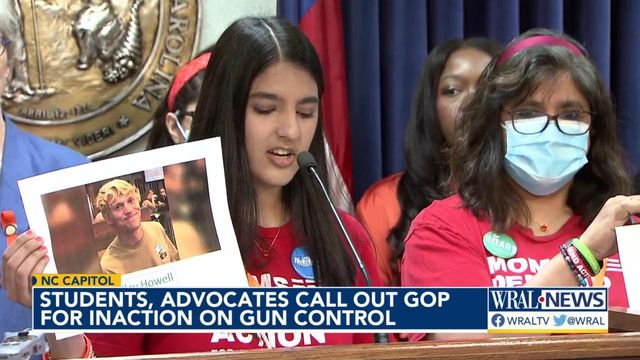Gun-control advocates call out GOP lawmakers for blocking reform measures
Democratic lawmakers have filed many gun safety bills over the past decade, but Republican House and Senate leaders haven't allowed them to be heard. In the wake of yet another school massacre, advocates are calling on GOP leaders to reconsider.
Posted — Updated"I should feel safe to drop my kid off at school and not have to worry about some mass shooting," Daniels told WRAL News. "But now that it’s becoming normalized, it’s scary. It’s a scary thought. Other kids are seeing this happen and seeing this being OK. What are we going to do to address this issue?"
Gun violence is a big problem in Daniels' hometown of Rocky Mount. "It’s not people going out and strangling or using their hands – it’s the guns," she said.
But GOP legislative leaders don't see it that way. Democratic lawmakers have filed more than a dozen bills over the past decade to restrict access to guns and expand background checks. But Republican House and Senate leaders haven't allowed a single proposal to even be heard in committee, let alone come to a vote.
"I don't think the voters of the state want to see North Carolina go down the road of all this gun control that does not work," said House Speaker Tim Moore, R-Cleveland.
Democratic state lawmakers are pushing Republican leaders to reconsider. At a news conference Thursday, Rep. Caleb Rudow, D-Buncombe, said after the shooting in Uvalde that left 21 dead, his phone was ringing nonstop with constituents asking him to do something to prevent school shootings.
"We should be debating this in committee," Rudow said. "We should be debating this on the House floor to find solutions that work for both sides. But instead, we are given a moment of silence on the House floor to honor the victims. Our bills are hidden away. And we have no discussion about how we stop gun violence in our state."
Leah Krevat is a student gun-control advocate with Students Demand Action. She said her high school had six lockdowns last year and that she worries every day that one of the threats will be real.
"I shouldn't have had to grow up this way," Krevat said at a news conference. "This should have ended after 20 children and six teachers were murdered at Sandy Hook. This should have been solved after the shooting in Parkland, Florida where 17 were murdered. This should have ended a long time ago. This is unacceptable."
Sen. Natalie Murdock, D-Durham, said she has drafted an amendment — it's too late in the session to file new bills — to study whether keeping gun stores at least 1,400 feet away from schools helps to reduce school shootings.
In recent years, Democratic lawmakers "have proposed legislation to enact red flag laws to temporarily restrict a person's access to acquiring a firearm if they present a physical harm to themselves or others. It was rejected. We have proposed ways to close loopholes to keep assault weapons out of the hands of the wrong people. That was rejected," Murdock said.
"Let's not gavel out this summer and, yet again, fail to do anything," she said. "This is the work that we were elected to do."
Rep. Marcia Morey, D-Durham, is the sponsor of House Bill 525, the proposed red flag law. She said that last week, after the Uvalde shooting, she spoke with Moore about it.
"I said, 'Let's move something. Can we sit down? Can we have a talk? Let's talk about one bill, and let's move something,'" she said. "And the answer was no."
Moore confirmed the conversation. He’s opposed to any form of gun control. "It would simply just take guns away from law-abiding citizens," he said. "The thing that you want to stop a bad guy with a gun is a good person with a gun."
When WRAL asked about the Uvalde shooting, where armed law enforcement was criticized for not stopping the shooter quickly, Moore responded, "I think there's a lot of questions about what happened there, what went wrong."
"Look at states that have tough gun control laws," he added. "Look at Washington, D.C. Look at Chicago. Those are the murder capitals of the country. It clearly doesn't work," he added.
Moore said House and Senate Republicans prefer to invest in school safety. "Last year, we put $83 million in the school safety," he said. "That is one of the most robust investments in school safety in the country. We also invested more funds into behavioral health to deal with that as well."
On the federal level, U.S. Sen. Thom Tillis co-sponsored legislation Thursday to allow tens of millions of dollars in unspent pandemic relief funds to be used for school security measures, including locks, panic buttons, surveillance systems and hiring armed officers. “Every child deserves to feel safe and secure at school and should never fear for their lives,” Tillis, a North Carolina Republican, said in a statement. “The tragedy in Uvalde should never happen again.”
The National Rifle Association, which opposes gun control measures, has been a generous donor to North Carolina Republicans.
The NRA donated large sums to top state lawmakers in the 2020 election cycle. The group’s political action committee donated the maximum amount allowed under state law — $5,400 — to the campaigns of Moore, Lt. Gov. Mark Robinson and Senate leader Phil Berger, according to state elections records.
Tillis has received at least $4.4 million from the NRA, according to data by the Brady Campaign to Prevent Gun Violence from 2019.
Political experts say Republican lawmakers aren’t as reliant on the NRA’s financial assistance as they are on its broader support. The organization has a large mailing list that it can use to contact gun rights advocates during elections.
• Credits
Copyright 2024 by Capitol Broadcasting Company. All rights reserved. This material may not be published, broadcast, rewritten or redistributed.





